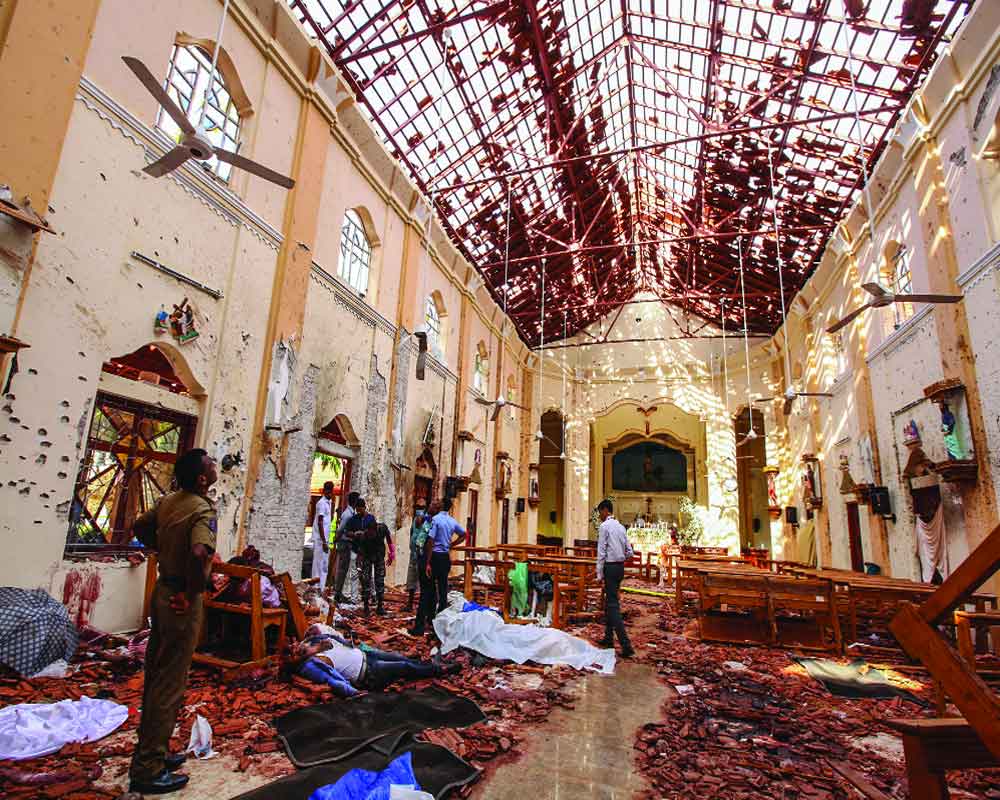Lankan Muslims have backed the Government’s crackdown methods against the Islamists in the wake of the Easter blasts, but the success of the efforts hinges on the narrative the Lankan Govt is able to construct
The Easter Sunday fidayeen attacks in Sri Lanka are unique for three reasons. First, the island nation — unlike its neighbours: India, Pakistan, and Bangladesh — had not seen till then any terror act by proclaimed Islamist forces. Second, the perpetrator ISIS, despite being badly battered and ousted from the land of its Caliphate just a month before, has told the world loud and clear that it still has potential to surprise new territories with its lethal action.
Third, the curious selection of the island nation for the suicide blasts by ISIS, in connivance with Lankan-based National Thowheeth Jamaath, raises a pertinent question: Whether the erstwhile ethnic divide in Sri Lanka was reborn in religious radicalisation?
However as there has never been any systemic discrimination against Muslims in the Sri Lanka — an essential ingredient for the breeding of religious radicals — this question warrants special attention, also because experience shows that Islamist forces, particularly ISIS, have flourished only in those regions which are afflicted with pre-existing conflicts - sectarian, ethnic, or religious.
Despite local and global Intelligence reports suggesting that National Thowheeth Jamaath and its south Indian cohorts have been in touch with ISIS for long, the choice of Sri Lanka for the revolting attacks is more to do with the peaceful island nation being a safe target for ISIS, which is desperate to stay in the reckoning for global Islamist terror leadership. ISIS, which wielded enormous control over huge area stretching from eastern Iraq to western Syria till March this year, is straining every nerve to peddle a global narrative that its loss of 88,000km territory doesn’t mean that ISIS has lost its Islamist appeal for global jehad. And here it needed a solid platform to announce the same.
Seen in this context, the reclusive ISIS chief Abu Bakr al-Baghdadi made the first appearance in five years, before the global media in a video message to readily claim the responsibility for the Lankan terror attacks. He used the occasion to outline the crumbling outfit’s vision, calling for jehad via war of attrition, and insisting on its propaganda of robust presence in South-east Asia, including the Philippines.
Baghdadi also exhorted the “believers” for hijrah (migration) to the Afghanistan-Pakistan region for recruitment of jehadis. The ramifications can be found in Sri Lanka Army Commander Lieutenant General Mahesh Senanayake’s interview to the BBC in which he claimed that some of the “suicide bombers visited Kashmir and Kerala for some sorts of training or to make some more links with other foreign outfits”. Maybe this explains why Sri Lanka became the sure-shot target for homeless Baghdadi, who has lost his last redoubt in Syria.
Although Baghdadi claims caliphate is not bound by the geography, he is raring to gain lost ground in Iraq and Syria. ISIS already has a covert network in Iraq. Therefore, it is essential that the coalition forces should maintain its hold in the areas of ISIS caliphate till it destroys the outfit’s raison d’être.
As for Sri Lanka, the island nation needs to ensure ISIS doesn’t succeed in having local franchises there. Considering the sophistication of the highly coordinated attacks all by Lankan nationals, the bigger riddle for Colombo is to unravel whether any of its citizen ever fought for ISIS outside the country, and, more specifically, to ensure, if they did, they land in prison.
Although Sri Lankan Muslims have supported the Government’s crackdown methods against the Islamists in the wake of the Easter bombings, the success of the efforts hinges on the narrative the Government is able to construct. Any ostentatious action against religious-cultural symbol is fraught with the danger of spawning more radicals born out of the narrative of the State operation. Therefore, the burqa (face veil) ban may be a pragmatic decision — considering the facts that some of women accomplices of the suicide bombers had fled the scene in burqa — for the time being till the raids and investigation are over, the ban should be lifted as soon as possible before Islamist outfits can exploit the situation with newfound purpose and energy.
(The writer is Associate Editor & News Editor, The Pioneer)

























